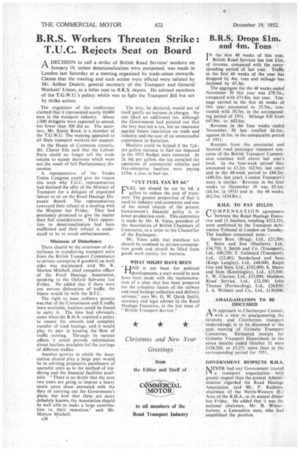B.R.S. Workers Threaten Strike : T.U.C. Rejects Seat on Board
Page 28

If you've noticed an error in this article please click here to report it so we can fix it.
A DECISION to call a strike of British Road Services' workers on " January 19, unless denationalization were postponed, was made in London last Saturday at a meeting organized by trade-union stewards. Claims that the meeting and such action were official were refuted by Mr. Arthur Deakin, general secretary of the Transport and General Workers' Union, in a letter sent to B.R.S. depots. He advised members of the T.G.W.I.J.'s policy. which was to fight the Transport Bill but not by strike action.
The organizers of the conference claimed that it represented nearly 10.000 men in the transport industry. About 1,000 delegates were expected to attend, but fewer than 300 did so. The secretary, Mr. Sonny Read, is a member of the T.G.W.U. The meeting appealed to all State transport workers for support.
In the House of Commons recently, Mr. Chuter Ede said that the Labour Party could no longer tell the trade unions to accept decisions which were not the result of full Parliamentary discussion.
A representative of the Trades Union Congress could give no reason this week why T.U.C. representatives had declined the offer of the Minister of Transport for a delegate of organized labour to sit on the Road Haulage Disposals Board. The representatives conveyed their refusal at a meeting with the Minister last Friday. They had previously promised to give the matter their full consideration. Their opposition to denationalization had been reaffirmed and their refusal is understood to be to avoid embarrassment.
Minimum of Disturbance
There should be the minimum of disturbance in transferring transport units from the British Transport Commission to private enterprise if goodwill on both sides was maintained, said Mr. R. Morton Mitchell, chief executive officer of the Road Haulage Association, speaking to the Oxford Sub-area last Friday. He added that if there were any serious dislocation of traffic, the blame would lie with the B.T.C.
The right to issue ordinary permits was that of the Commission and if traffic were available, hauliers could be found. to carry it. The time had obviously.. come when the R.H.A. required a policy to ensure the smooth and complete transfer of road haulage, and it would play its part in keeping the flow of traffic moving. Through its various offices it could provide information about hauliers available fof the carriage of different traffics.
Another activity in which the Association should play a large part would be in advising propective purchasers of operable units as to the method of tendering and the financial facilities available. "There is no doubt that the next two years are going to impose a heavy strain upon those entrusted with the duty of carrying out the Government's plans, but now that these are more definitely known, the Association should be well able to make a large contribution to their execution." said Mr. Morton Mitchell,
A26
The levy, he declared, would not of itself justify an increase in charges. No one liked an additional. tax, although the Government had pointed out that the levy was not a tax. but an insurance against future restriction on trade and industry and the cost of an unsuccessful experiment in Socialism.
Hauliers could be helped if the 7d.per-gallon increase in fuel tax imposed in the 1952 Budget were removed. At 2s. 6d. per gallon. the lax curtailed the operation of commercial vehicles and free-enterprise hauliers were paying £15m. a year in fuel tax.
"CUT FUEL TAX BY 6d."
L'UEL tax should be cut by 6d. a
gallon to reduce the cost of transport. The greater proportion of fuel is used by industry and commerce and one of the slated objects of the present Government's financial policy is to lower production costs. This contention is made by Mr. H. Yates, president of the Association of British Chambers of Commerce, in a letter to the Chancellor of the Exchequer.
Mr. Yates adds that purchase tax should be confined to private-consumption goods and should be lifted from goods used mainly for business.
WHAT MIGHT HAVE BEEN
" 14AD it not been for political
"developments, a start would by now have been made with the implementalion of a plan that has been prepared for the complete fusion of the railway and road haulage collection and delivery services," says Mr. G. W. Quick Smith, secretary and legal adviser to the Road Haulage Executive. in the last issue of " British Transport Review."




















































































